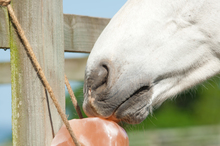During cold weather when many horses have more relaxed schedules some horse owners may forget that horses continue to need access to additional salt in their diets in spite of a lesser work load and dropping temperatures.

Horse licking a Himalayan salt block
During cold weather, salt helps promote enough water consumption by the horse to prevent dehydration and during warm weather, salt replaces that lost in perspiration.
In a review of consumer data by SmartPak, it was determined that 60% of horses were not receiving adequate amounts of sodium in their daily diets. For a horse's body to function properly, most horses need at least 12 grams of salt per day.
According to horse nutritionist Dr. Juliet Getty, regardless of the weather, horses require a daily supply of salt. During cold weather, salt helps promote enough water consumption to prevent dehydration. In warm seasons, salt replaces what is lost from perspiration. A full-sized horse requires at least one ounce (two level tablespoons or 30 ml) of salt each day for maintenance; this much provides 12 grams of sodium. Heat, humidity, and exercise increase the horse's need.
Since salt requirements are markedly influenced by sweat losses. It is recommended that horse rations contain 1.6 - 1.8 g salt/kg feed dry matter, although there are limited data on the precise requirements. The upper limit for salt inclusion in the ration of even hard-working horses is recommended at 6% of the total ration.
There are several ways to provide salt. The best ways include offering free-choice granulated salt, or adding salt to your horse's meal (for palatability, limit the amount to no more than 1 tablespoon per meal).
A salt block should be available should your horse want more. Unfortunately many horses do not lick salt blocks adequately since they can be irritating to the tongue. Mineralized blocks often go untouched due to their bitter taste; however a Himalayan salt block is often preferred.
Some veterinarians and horse nutritionists recommend Himalayan salt blocks for several reasons: These salt licks are a great source of iron, potassium, and magnesium, which are all vital intake for maintaining horse health. Licking a salt block is also a great way for your horse to relieve boredom.
The distinctive rose pink color of the Himalayan salt block comes from the salt's high mineral content. Salt licks are literally "rock hard," which means that horses are unable to bite chunks off the block. These licks are also weather-resistant and can be safely left outside in the field. They will not dissolve in the rain.
Fortunately, salt is a mineral for which horses are known to have "true nutritional wisdom." Horses voluntarily seek out and consume salt in amounts to meet their daily needs if given the opportunity.
In addition to providing adequate salt, it is important to make sure that plenty of fresh, clean water is available in a drinkable state all year round.
